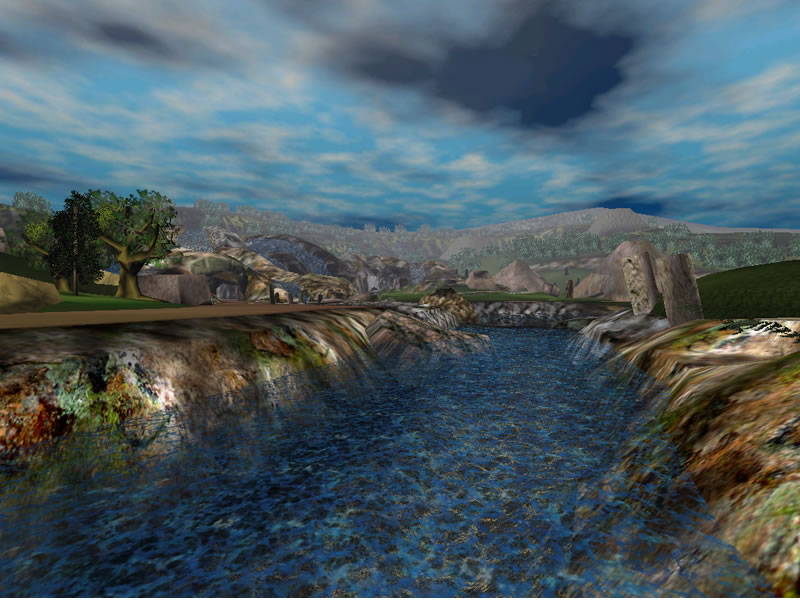The Appeal of Virtual Worlds
Okay, just to get this out of the way first, let me say that I’m not one of those writers who feels the need to respond to every poor or weak review of his work. People can say they don’t like my stuff, and I don’t feel like I have to defend it publicly.
However, (you had to know that was coming, right?) a less-than-stellar review of Strictly Analog last week got me thinking about some bigger issues, so I guess you could say I’m making lemonade out of the lemons that reviewer left me.
The reviewer’s concern was with science fiction books that deal with Virtual Reality and the tendency for characters to turn into Superman once they enter the virtual world, solving with ease all the problems they struggled with in Actual Reality. I think what the reviewer was really trying to say was that this has become kind of cliché in stories about characters entering a cyber world. And he may be right. I can think of a lot of examples where the Virtual World becomes the plaything for the tech-savvy character who’s entered it, kind of like Clark Kent arriving from Krypton.
I will now stoop to defending my book, but only briefly. Feel free to skip this paragraph if such responses to criticism bug you. Without spoiling anything, I’ll just say that while my character is able to do things in the virtual world he couldn’t do otherwise, he’s also still pretty vulnerable and can’t succeed without help–which is kind of the point of the whole book.
But enough of that.
The bigger question to me has to do with why some SF writers (myself included) have this tendency to paint the virtual world as one in which characters can succeed where they had previously failed. And it’s a question that has a lot to do with science fiction in general as well as the genre’s appeal.
Much of the science fiction written about the advent of a Virtual World–whether it’s cyberpunk or something else–taps into the same desires and fantasies that make the Internet so appealing in the Actual World. We can do things online that we couldn’t do otherwise–from shopping in stores around the world to changing our identities to gaming with people in Kyrgyzstan. And that freedom from limitations is exhilarating, especially for people (like me) old enough to remember a world without personal computers and Wifi hotspots, a world where limitations and boundaries were far less liquid than they are today.
When we take the limitless possibilities of the Internet and project them into the future, creating a fictional world where this fantasy gets exponentially pumped up to a new level, it only seems natural that writers would enable their characters to do all sorts of amazing things in their Virtual Realities. It’s wish fulfillment and appeals to readers of SF in the same way that steamy love scenes appeal to readers of romance novels, and in the same way that science fiction about exploring and conquering other worlds appealed to early 20th century readers who had watched all the exploration and conquering on this world lead to some horrible global conflicts. In science fiction, they could get it right.
Of course, there were clichés in those works as well, and there are clichés in other genres, too. I think the best science fiction takes the themes that appeal to readers’ fantasies, extrapolating from current social and scientific trends, and twists their plots just enough so they’re not pure fantasy, but rather mirrors through which readers can see themselves and their actual society through the haze of fantasy and wish fulfillment.
If we go back to the beginnings of cyberpunk, the narrator of Gibson’s “Burning Chrome” isn’t a Superman, and even if his console cowboy partner acts like he’s got special powers because of his cyber prowess, readers see through him the same way the narrator does, and see, too, the folly of being too full of oneself, of never being satisfied with what one has–a profound and maybe uncomfortable realization that has its roots in reality but needs to be rendered as fantasy for it to be acceptable and digestible for readers.
Science fiction serves many purposes, and one of them is to get readers to think not just about future technology but about current technology and what it’s doing to us. We have to be careful not to let our fantasies run away with us. At least sometimes.
"Burning Chrome" actual reality Clark Kent cyberpunk Internet Krypton literature Science Fiction science fiction books sf writers Strictly Analog Superman Virtual Reality William Gibson









4 Responses
It’s risky for authors to respond to criticism of their books (even when the criticism comes from readers dabbling in unfamiliar genres), but you did it very well here and produced a a thought-provoking post.
Thanks for that. I really hesitated to post anything about this and tried hard not to sound whiny. Glad it came across the right way. Thanks for reading.
Isn’t that part of the point of virtual worlds, to allow the main character and other things to do what is impossible in the real world?
I absolutely agree. I think I was dealing with someone who didn’t see it the same way, though, or just had seen it too many times.
Comments are closed.